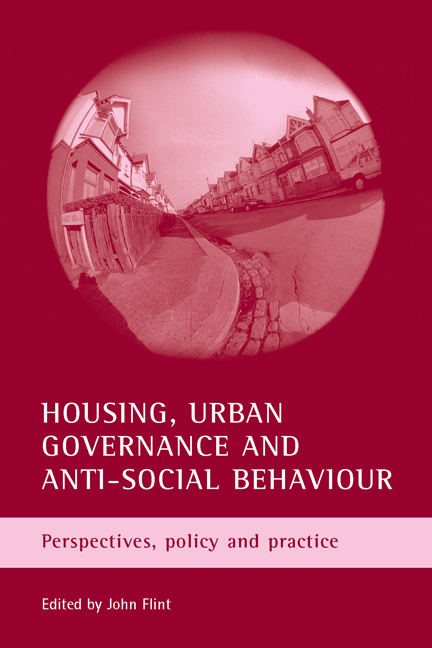Book contents
- Frontmatter
- Contents
- List of tables, figures and photographs
- Acknowledgements
- Notes on contributors
- Introduction
- Part 1 The definition and construction of anti-social behaviour in the UK
- Part 2 Legal techniques and measures utilised by social landlords to address anti-social behaviour
- Part 3 The emerging mechanisms of addressing anti-social behaviour in housing governance
- Part 4 Studies of housing and anti-social behaviour from an international perspective
- Index
nine - Evaluating the Shelter Inclusion Project: a floating support service for households accused of anti-social behaviour
Published online by Cambridge University Press: 15 January 2022
- Frontmatter
- Contents
- List of tables, figures and photographs
- Acknowledgements
- Notes on contributors
- Introduction
- Part 1 The definition and construction of anti-social behaviour in the UK
- Part 2 Legal techniques and measures utilised by social landlords to address anti-social behaviour
- Part 3 The emerging mechanisms of addressing anti-social behaviour in housing governance
- Part 4 Studies of housing and anti-social behaviour from an international perspective
- Index
Summary
Introduction
Social landlords in the UK have become more rigorous in responding to anti-social behaviour (ASB), partly reflecting increasing public expectations and central government priorities. There are no figures to indicate whether social landlords’ use of possession actions for ASB has risen in recent years but research has shown that the use of possession action and eviction is widespread (see Chapter Eight, this volume). More than two thirds of social landlords initiated possession actions in response to ASB in 2002/03, with more than a third implementing evictions on these grounds (ODPM, 2005). It has been suggested that figures may understate the real impact of ASB on evictions as social landlords may prefer to cite rent arrears as the main reason for eviction (Communities Scotland, 2005). While enforcement is clearly an important aspect of any policy it is widely recognised that in order to be effective the problem of ASB has to be addressed holistically.
Research suggests that perpetrators of ASB are often vulnerable and usually poor, that they often have mental health problems and community care needs and may themselves be victims of ASB (see Chapter Four, this volume, and also Nixon et al, 2000; Campbell, 2002). Although ASB is not tenure-specific it tends to be associated with wider social exclusion problems such as poverty, family stress, community disorganisation, drug dependency, and truancy and school exclusion (SEU, 2000). The impact of eviction and exclusion from social housing may exacerbate these problems leading to a cycle of eviction and homelessness. As the Social Exclusion Unit has noted:
Evicting anti-social people does not mean that the problem will go away. Some people will be deterred from future anti-social behaviour by the experience of eviction … some will not. If their problems are not addressed, the pattern of behaviour will repeat itself. (SEU, 2000, p 58)
Although the need for a ‘three-pronged’ approach to ASB, embracing prevention, enforcement and rehabilitation, has been recognised by the government (SEU, 2000; DTLR, 2002), research suggests that most of the initiatives and measures developed to deal with ASB tend to focus on enforcement and, to a lesser degree, the prevention of ASB.
- Type
- Chapter
- Information
- Housing, Urban Governance and Anti-Social BehaviourPerspectives, Policy and Practice, pp. 179 - 198Publisher: Bristol University PressPrint publication year: 2006



